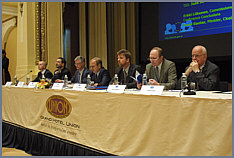 |
 A two-day conference has come to an end A two-day conference has come to an end
(Published on: 05.06.2002)
|
 Among the 500 participants, about 30 ministers or deputies representing all 13 candidate countries, several EU Member States, and the countries of South-East Europe, and delegates from the private sector, financial institutions, civil society movements and academia have come. Organisation on such a high level with such wide and diversified participation in the field of information and communication technologies is a great acknowledgment and stimulus for Slovenia. Participants stressed the importance of information society for maintaining cultural diversity, social cohesion and strengthening european economic integration. By making use of the advantages offered by the fast development of ICT and deeper cooperation between public and private sector and civil society movements Europe could become the most dinamic, knowledge-based economy world-wide. Among the 500 participants, about 30 ministers or deputies representing all 13 candidate countries, several EU Member States, and the countries of South-East Europe, and delegates from the private sector, financial institutions, civil society movements and academia have come. Organisation on such a high level with such wide and diversified participation in the field of information and communication technologies is a great acknowledgment and stimulus for Slovenia. Participants stressed the importance of information society for maintaining cultural diversity, social cohesion and strengthening european economic integration. By making use of the advantages offered by the fast development of ICT and deeper cooperation between public and private sector and civil society movements Europe could become the most dinamic, knowledge-based economy world-wide.
Over three plenary sessions the participants have discussed some topical issues in the field of information society. Mainly that information infrastructure, applications and other electronic services should provide equal inclusion of citizens, civil society movements, public administration and regions. Solely equal participation of all actors helps to bridging digital divide. Countries have stressed the need for deeper trust in ICT, prerequisite for which are secure networks and electronic services. Over three thematic sessions the participants have discussed knowledge-based society and economy, information infrastructure and electronic services at local level. The participants have given a great deal of attention to the exhibition of applications from candidate countries. The ministers have had besides presenting the two key documents of the conference, the Progress report and Ministerial Conclusions, numerous bilateral meetings.
The results presented in the first progress report show that the candidate countries have defined national action plans and programmes and that considerable progrees is being made with the implemntation of a coherent and effective policy and regulatory framework, based on EU acquis. The candidate countries have on the one hand in common high percentage of fixed telephone lines and mobile penetration, the fact that they donnot make sufficient use of alternative internet access technologies, and on the other hand they vary widely in internet access costs. Both the costs of internet access as well as the cost of purchasing a PC appear to act as blocking factors in household penetration rates for internet access. Consequently, public internet access points remain a very important means of internet access for the population at large. The penetration of computers in schools is still relatively low, with substantial divergence between the countries for all three levels (primary, secondary, and tertiary). The results also show that little or no data is available in areas such as eCommerce, environment, transport and several other areas of the eEurope+ 2003. The countries also report on progress being made in the provision of public on-line services through eGovernment actions.
Despite significant progress with the development of information society, the candidate countries still lag behind the EU average. Much effort will be needed for further development, that is why the countries will strive for competitive framework, for introduction of alternative internet access technologies, for higher penetration of computers in schools and their better connection to internet, for bridging digital divide, for better education systems, for higher percetage of investinf in knowledge and youth, for greater provision of internet public access points, for provision of digital content and services, for further development of public on-line government services and content on local level, for provision of additional ICT working places and final harmonisaion in the field of information society (especially in the field of eCommerce). |
Republic of Slovenia, Ministry of Information Society in co-operation with the European Commission, DG Information Society and DG Enlargement
Contact info: gp.mid@gov.si
Web: http://emcis.gov.si, http://www.europa.eu.int/eeuropeplus
|